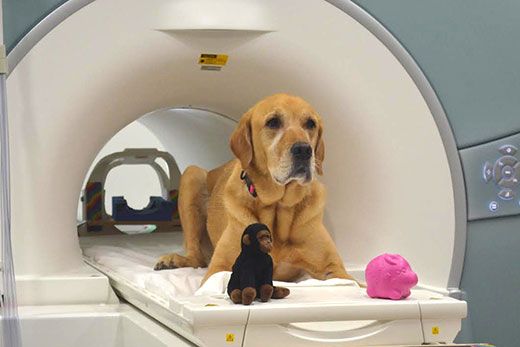
As dog owners know, when a canine hears the word "walk, it often becomes excited. But does the animal really understanding the meaning—i.e. can it picture going for a walk—or does the word simply alert the canine to the fact that something is about to happen?
To try and address whether dogs understand human speech, researchers from Emory University have conducted one of the first studies to use brain-imaging techniques in order to investigate how canines process words.
The results—which are published in the journal Frontiers in Neuroscience—indicate that dogs may have at least a rudimentary representation in their brains for the meaning of words, as they are able to differentiate words they've heard before from those they haven't.
"Many dog owners think that their dogs know what some words mean, but there really isn't much scientific evidence to support that," Ashley Prichard, first author of the study from Emory's Department of Psychology, said in a statement. "We wanted to get data from the dogs themselves—not just owner reports."
"We know that dogs have the capacity to process at least some aspects of human language since they can learn to follow verbal commands," said neuroscientist Gregory Berns, senior author of the study. "Previous research, however, suggests dogs may rely on many other cues to follow a verbal command, such as gaze, gestures and even emotional expressions from their owners."
Bern is founder of the Dog Project, which is exploring several aspects of canine psychology. The project was the first to train dogs to voluntarily enter a functional magnetic resonance imaging (fMRI) scanner and remain motionless during the process, without restraint or sedation—a technique that's utilized in the latest research.
At a basic level, understanding a word would require the discrimination of words from non-words. So, for the study, the Emory team wanted to investigate the brain mechanisms dogs use to differentiate between words, and furthermore, what constitutes a word to a dog.
Firstly, they asked the owners of 12 dogs (of varying breeds) to train their pet to retrieve two different objects and associate a name to both. The pair of toys in each case had to be different in texture to facilitate discrimination. For example, one owner used a soft stuffed monkey and a hard rubber pig.
The training involved instructing the dogs to fetch one of the objects and then rewarding them with food or praise. The process was considered complete when the dog in question could discriminate between the two toys by consistently fetching the one requested by the owner when presented with both objects.
After the training, the researchers conducted an experiment where each dog lay in the fMRI scanner while its owner stood directly outside and said the names of the two objects at set intervals, before showing the animal the corresponding toy. As a control the owners would then say a gibberish word, before showing the dog an object that they hadn't seen before.
The team found that regions of the dogs' brains responsible for auditory processing were more activated when they heard the gibberish words when compared to the trained words.
According to the researchers, this demonstrates that dogs process human speech at least to the extent of differentiating words they've heard before from those they haven't. But it still remains unclear whether the words represent anything to them.
"We expected to see that dogs neurally discriminate between words that they know and words that they don't," Prichard said. "What's surprising is that the result is opposite to that of research on humans—people typically show greater neural activation for known words than novel words."
The researchers hypothesize that the dogs may show greater neural activation to a novel word because they get a sense that their owners want them to understand what's being said and so make an effort to do so.
"Dogs ultimately want to please their owners, and perhaps also receive praise or food," Berns said.
Curiously, the results showed some differences between the dogs. Half of them displayed increase neural activation in an area of the brain known as the parietotemporal cortex—which may be analogous to the angular gyrus in humans, which is responsible for processing lexical differences.
The other half, meanwhile, showed heightened activity to novel words in other brain regions, such as the amygdala, caudate nucleus and the thalamus. These variations could be explained by limitations in the study, the researchers say, such as the varying breeds used and their potentially differing cognitive abilities.
"Dogs may have varying capacity and motivation for learning and understanding human words," Berns said, "but they appear to have a neural representation for the meaning of words they have been taught, beyond just a low-level Pavlovian response."
Despite the findings, the researchers suggest that spoken words may not be the most effective way of communicating with dogs. Previous research conducted by Prichard and Berns showed that the neural reward system in dogs is more attuned to visual and scent cues over verbal ones.
"When people want to teach their dog a trick, they often use a verbal command because that's what we humans prefer," Prichard said. "From the dog's perspective, however, a visual command might be more effective, helping the dog learn the trick faster."
Uncommon Knowledge
Newsweek is committed to challenging conventional wisdom and finding connections in the search for common ground.
Newsweek is committed to challenging conventional wisdom and finding connections in the search for common ground.
About the writer
Aristos is a Newsweek science reporter with the London, U.K., bureau. He reports on science and health topics, including; animal, ... Read more
To read how Newsweek uses AI as a newsroom tool, Click here.








